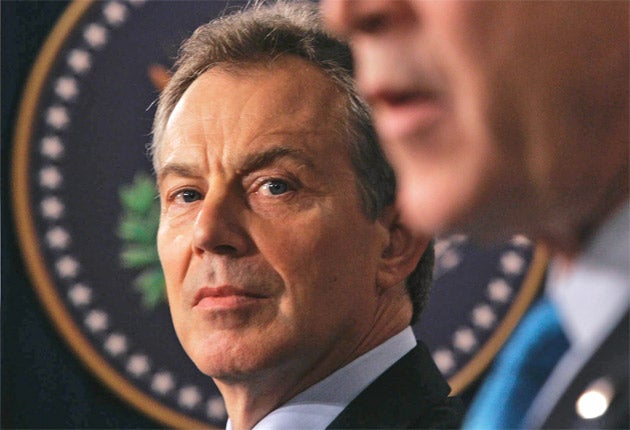Iraq: the last secret
Crucial UK-US memos to remain hidden after Cabinet Office discussion with Tony Blair

Private memos sent between Tony Blair and George Bush in the months leading up to the Iraq invasion are to be kept secret after the head of the Civil Service consulted the former prime minister and refused to allow their publication.
The Cabinet Secretary, Sir Gus O'Donnell, vetoed attempts by the Iraq Inquiry to publish "key extracts" from the telegrams, which are regarded as highly significant by the inquiry team. The inquiry chairman, Sir John Chilcot, described Sir Gus's decision as a serious blow to transparency.
One memo sent by Mr Blair in 2002 is said to have reassured the US president that Britain would be "absolutely with you" should he take military action against Saddam Hussein.
The decision may severely hamper the inquiry team's ability to question the former prime minister about when he decided Britain would join the US-led invasion. Senior Whitehall sources confirmed last night that while the committee members would be allowed to refer to the memos, they would not be able to discuss them in detail.
The Cabinet Office confirmed that Sir Gus had consulted Mr Blair before he decided not to authorise publication of the documents. A spokeswoman said: "There is an established convention covering papers of a previous administration whereby former ministers would normally be consulted before release of papers from their time in government."
The Independent revealed in November 2009 that a secret deal had been struck between the inquiry and Gordon Brown, then the Prime Minster, giving Sir Gus the final veto over the release of sensitive documents.
Critics, including the Deputy Prime Minister, Nick Clegg, warned that the protocols of the inquiry would mean the most damaging material would be kept secret.
The veto will put Sir Gus under scrutiny when he returns to answer questions in public before the inquiry next week. He is scheduled to appear for three hours next Friday.
Speaking at the reopening of the public evidence sessions yesterday, Sir John said he was disappointed that the Cabinet Secretary "was not willing to accede to its request".
"This means that in a narrow but important area the inquiry may not always be able to publish as fully as it would wish the evidential basis for some of its comments and conclusions."
Sir John made a series of attempts to persuade Sir Gus to change his mind. He first wrote to him last month in an attempt to have the most important extracts of the memos released. He noted that several prominent figures including Mr Blair, Mr Bush and Alastair Campbell had all referred to them in their political memoirs.
"The inquiry regards it as essential in order to fulfil its terms of reference, to be able to chronicle the sequencing of discussions on Iraq between the UK prime minister and the president of the United States," he stated.
"It seems to us that it is both contrary to the terms of the protocol and, in light of the disclosures in recent memoirs, unnecessary to prevent the inquiry from being able to do this."
Sir John added that it was "essential, if it is to produce a reliable account, that [the inquiry team] is able to quote extracts from the records of what the prime minister said to President Bush in their discussions on Iraq."
He sent a further letter making it clear that Friday's cross-examination of Mr Blair would be damaged by the decision to keep the memos secret.
"Given Mr Blair's decision to disclose some of the content in [his memoirs] A Journey, the committee is likely to be disappointed if he is less forthcoming in his evidence to us," he said. "This approach is also likely to increase the length of the hearing."
He also argued that knowing when the former prime minister committed Britain to military action was central to the whole purpose of the inquiry.
In response, the Cabinet Secretary said releasing the material was not in the public interest. "I judge that their release would, or would be likely to, damage the UK's international relations," he wrote, adding that protecting the special relationship between the US and Britain was of "particular importance".
"The majority of the inquiry's declassification requests have been met. But there are important public interest principles at stake."
The secret memos
The private memos sent between Tony Blair and President George Bush are understood to contain information about the promises Mr Blair made to Mr Bush about Britain's readiness to join any military action in Iraq. In one, the then prime minister is said to have assured Mr Bush that Britain would "be there" if an invasion became necessary. In June 2002, Mr Blair told MPs that "there are no decisions which have been taken about military action".
The fact that Sir John Chilcot, who is often criticised as being too mild mannered, repeatedly battled to have the memos declassified suggests they are of central importance to his conclusions.
Join our commenting forum
Join thought-provoking conversations, follow other Independent readers and see their replies
Comments